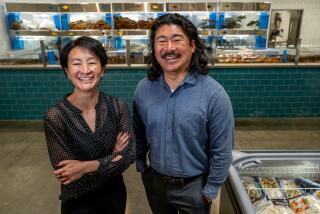Family-Owned Businesses Are Still the Heart and Soul of Asia
- Share via
Recently, our family business, William E. Simon & Sons, expanded its shipping investments in Asia with the addition of two 20,000- to 30,000-ton freighters. Demand for these bulk carriers--which trade dry cargo goods such as timber and building materials throughout the islands of the Pacific--has skyrocketed in response to the region’s rapid growth.
This is the latest in a series of diverse investments in Asia by our firm. Recognizing the enormous potential of the region, my father, former U.S. Treasury Secretary William E. Simon, began to establish relationships more than a decade ago with a wide range of leading family businesses in Asia at a time when most Americans were still focused on Europe.
Those relationships have grown and developed over the years, bringing with them opportunities that come only from an understanding that doing business in the Far East is different from our Western approach.
Unlike the United States--where the largest corporations are owned by shareholders, with management seldom having a controlling stake--Asian economies are largely rooted in thousands of family-owned businesses. Some of these families control giant companies with revenues in the billions of dollars. They often are far-flung, interlocking empires, and often comprise interests as varied as construction, shipping and consumer electronics.
In the United States--people sometimes think that one would only work for a family-owned business if one could not land a job elsewhere. But family businesses are the heart and soul of Asia.
Business is an obsession with these Asian families, a 24-hour-a-day commitment. And it is as much personal as professional. Because these families are close-knit and generally wary of foreigners, it takes time to cultivate relationships and nurture them to full bloom.
What are the keys to developing these relationships? It’s quite simple: Your word must be your bond. Contracts and lengthy negotiations through third parties such as lawyers are only secondary; first comes trust. You must follow through on commitments. You must demonstrate loyalty. You must honor confidences.
In addition, we Americans must learn to think in the long-term like our Asian counterparts. We must be willing to live with volatility and hang in there when the going gets tough.
The payoff of transpacific relationships is great. Having a strong, respected local partner is crucial to navigating Asia’s inevitable investment minefields, and Simon & Sons has been fortunate to have several.
For example, the Bakrie family--the controlling shareholder in one of the leading business groups in Indonesia and, indeed, in the entire region--is one of our partners in William E. Simon & Sons (Asia), our Hong Kong-based merchant bank. With investments in mining, infrastructure, agriculture, real estate and financial services, the Bakries have opened the door to a wide network of investment and merchant banking opportunities for our firm throughout the region.
In turn, Simon Asia has been able to provide financial advice to the Bakrie family and its affiliates. The Bakries, who are heavily invested in telecommunications in Indonesia, encouraged our participation in a consortium that recently purchased Link Telecommunications--Australia’s leading personal mobile communications company--from Bell South.
Another of our partners, Government of Singapore Investment Corp., is recognized as one of the most active and prudent investment entities in the region. Together we have invested in a number of interesting investment opportunities in China.
One example is the world’s largest eye-wear manufacturer. Simon Asia devised an innovative financing structure for Swank International Manufacturing Co., which enabled the Hong Kong-based firm’s founder, Y. S. Lam, to obtain capital for growth but retain controlling interest for his family. When he solicited our advice, Mr. Lam was concerned that tapping the capital markets would dilute his interest in the company, and the Lam family would lose control.
Another arm of our investment strategy for China includes a group of worldwide family businesses. Among our partners in a China development fund are the Rockefellers, the Wallenbergs of Sweden, the Worms Group of France, the Santander Group of Spain and the Kuok family of Hong Kong.
While attention recently has been focused on strained U.S.-Japan trade relations and the succession question in China, extraordinary opportunities exist throughout the powerful and rapidly growing economies of the Pacific Rim. These nations have enormous resources--not the least of which is their industrious and innovative people.
Countries such as Indonesia, the Philippines, Malaysia and Vietnam will be fertile markets for the foreseeable future. California stands to gain the most, because of our window on the Pacific. Because of the enormous trade with Pacific nations, our ports are now the largest in the nation, and this growth should continue, mirroring the expansion in the Asian economies.
Tapping these markets will not only allow us to generate jobs and income at home, but also to enjoy the most richly rewarding and personally satisfying experience of all--building old-fashioned friendships.
More to Read
Inside the business of entertainment
The Wide Shot brings you news, analysis and insights on everything from streaming wars to production — and what it all means for the future.
You may occasionally receive promotional content from the Los Angeles Times.









